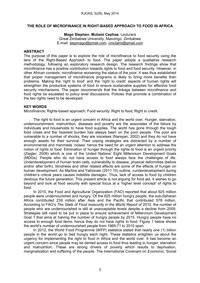THE ROLE OF MICROFINANCE IN RIGHT-BASED APPROACH TO FOOD IN AFRICA
Покупка
Основная коллекция
Издательство:
Редакция журнала RJOAS
Год издания: 2014
Кол-во страниц: 11
Дополнительно
Доступ онлайн
В корзину
Скопировать запись
Фрагмент текстового слоя документа размещен для индексирующих роботов.
Для полноценной работы с документом, пожалуйста, перейдите в
ридер.
RJOAS, 5(29), May 2014
THE ROLE OF MICROFINANCE IN RIGHT-BASED APPROACH TO FOOD IN AFRICA
Mago Stephen, Mutami Cephas, Lecturers Great Zimbabwe University, Masvingo, Zimbabwe E-mail: stepmago@gmail.com, cmutami@gmail.com
ABSTRACT
The purpose of this paper is to explore the role of microfinance to food security using the lens of the Right-Based Approach to food. The paper adopts a qualitative research methodology, following an exploratory research design. The research findings show that microfinance has a positive contribution towards rights to food and food security. However, in other African contexts, microfinance worsening the status of the poor. It was thus established that proper management of microfinance programs is likely to bring more benefits than problems. Making the ‘right to food’ and the ‘right to credit’ aspects of human rights will strengthen the productive systems of food to ensure sustainable supplies for effective food security mechanisms. The paper recommends that the linkage between microfinance and food rights be escalated to policy level discussions. Policies that promote a combination of the two rights need to be developed.
KEY WORDS
Microfinance; Rights-based approach; Food security; Right to food; Right to credit.
The right to food is an urgent concern in Africa and the world over. Hunger, starvation, undernourishment, malnutrition, diseases and poverty are the associates of the failure by individuals and households to have food supplies. The world has gone through the tough food crises and the heaviest burden has always been on the poor people. The poor are vulnerable to a number of shocks, they are voiceless (Narayan, 2002) and they do not have enough assets for their survival. Their coping strategies are distracted by a number of environmental and manmade ‘noises’ hence the need for an urgent attention to address the notion of rights to food. Elimination of hunger through the rights to food is an urgent priority (Ziegler, 2006) which is one of the United Nations’ Eight Millennium Development Goals (MDGs). People who do not have access to food always face the challenges of life. Underdevelopment of human brain cells, vulnerability to disease, physical deformities (before and/or after birth), blindness and other related effects are some of the effects of hunger on human development. As Martins and Yablonski (2011:10) outline, «underdevelopment during children’s critical years causes indelible damage». Thus, lack of access to food by children destroys the future generation. This present article is not arguing for food aid. It wishes to go beyond and look at food security with special focus at a ‘higher level concept’ of rights to food.
In 2010, the Food and Agricultural Organization (FAO) reported that about 925 million people were undernourished and hungry. Of the 925 million hungry people, the sub-Saharan Africa contributed 239 million after Asia and the Pacific that contributed 578 million. According to FAO’s The State of Food Insecurity in the World Report of 2010, the number of people who are undernourished is still at unacceptable levels despite a decline from 2009. Strategies still need to be put in place to ensure achievement of Millennium Development Goal 1 that aims at halving the number of hungry people by 2015. Hungry people have no access to enough food items; hence they do not have rights to food. Figure 1 below shows the world’s number of undernourished people from 1969-71 to 2010 span.
In 2012, the World Food Programme (WFP) statistics stated that nearly one (1) billion people in the world go to bed hungry each night. These statistics enlighten us about the urgency for implementing the right to food in Africa and the world over. It has become an urgent concern since people may be denied access to food thus leading to hunger, starvation and malnutrition. These are strong drivers of poverty which results to deprivation, marginalization and suffering of the people. The International Covenant on Economic, Social
3
Доступ онлайн
В корзину


